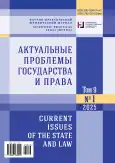Some problems of qualification of actions of officials who have committed crimes infringing on the rights of orphaned children and children left without parental care to provide comfortable living quarters under Part 2 of Article 315 of the Criminal Code of the Russian Federation
- Authors: Ziganshin T.R.1
-
Affiliations:
- 12 Vrubelya St., Moscow, 125080, Russian Federation
- Issue: Vol 9, No 1 (2025)
- Pages: 121-130
- Section: Current Issues of Criminal Legal Sciences
- URL: https://journal-vniispk.ru/2587-9340/article/view/295216
- ID: 295216
Cite item
Abstract
The relevance of the study is due to the significant number of orphans and children left without parental care, who are not provided with comfortable residential premises, despite the existence of court decisions that have entered into force, which until recently were considered as an alternative way to reduce the waiting time for housing. In many regions of the Russian Federation, orphans who have court decisions form a parallel queue with other orphans on the list. So, out of almost 22 thousand orphans who received housing in 2023 (financing of 2023), over 9.6 thousand were secured on the basis of court decisions. Thus, as of January 1, 2022, the number of orphans and children left without parental care who have outstanding court decisions on providing them with housing exceeded 35.6 thousand, as of January 1, 2023 it was over 34.1 thousand, and as of January 1, 2024 – about 28.7 thousand. Despite the clear downward trend, court decisions entered into force for almost 7300 orphans in 2023. Given the significant number of criminal cases on the facts of not providing orphaned children with housing, the purpose of the research is to study the need to apply, in addition to the main component of the criminal act, charges against persons involved in the commission of crimes under Part 2 of Article 315 of the Criminal Code of the Russian Federation regarding the failure to comply with court decisions that have entered into force. The existing judicial practice is analyzed, and a set of measures is being developed to prevent investigative errors that lead to negative consequences. In addition, an assessment is given of the need to involve individuals in additional criminal structures.
Keywords
About the authors
Timur R. Ziganshin
12 Vrubelya St., Moscow, 125080, Russian Federation
Author for correspondence.
Email: ztr.skrf@gmail.com
ORCID iD: 0009-0001-1568-1473
Post-Graduate Student, Faculty of Training of Scientific and Pedagogical Personnel and Organization of Scientific Research Work
Bouvet Island, Sukharev Moscow Academy of the Investigative Committee of the Russian FederationReferences
- Aksenova A.N. (2010). The social significance of criminal liability for non-enforcement of a court verdict, court decision, or other judicial act. Sovremennoe pravo = Modern Law, no. 2, pp. 124-128. (In Russ.) https://www.elibrary.ru/mtwfrj
- Bordakova A.G. (2000). To the question of the classification of special norms in Russian law. Pravo i gosudarstvo: teoriya i praktika = Law and State: Theory and Practice, no. 1 (181), p. 158. (In Russ.)
- Minakova I. (2008). Issues of qualification and differentiation of negligence from related crimes. Zakon i pravo = Legislation and Law, no. 8, pp. 77-78. (In Russ.) https://www.elibrary.ru/kckubl
- Gertsenzon A.A. (1947). Qualification of Crimes. Moscow, RIO VYuA Publ., 25 p. (In Russ.)
- Manova N.S., Panteleeva E.V. (2020). On the essence of procedural decisions in criminal proceedings. Pravo: istoriya i sovremennost’ = Law: History and Modernity, no. 2 (11), pp. 100-111. (In Russ.) https://doi.org/10.17277/pravo.2020.02.pp.100-111, https://www.elibrary.ru/tydscr
- Shikhanov V.N. (2022). Competition between general and special criminal law provisions. Zakonnost’ = Legality, no. 3 (1049), pp. 26-32. (In Russ.) https://www.elibrary.ru/cnaevt
- Besedin G.E. (2023). Disclosure of evidence of a witness, victim and convict in the Russian criminal procedure: history and modern times. Rossiiskii sud’ya = Russian Judge, no. 7, pp. 56-60. (In Russ.) https://doi.org/10.18572/1812-3791-2023-7-56-60, https://www.elibrary.ru/okjwmv
- Gorbunov D.V. (2014). Evidences of victim in criminal process. Obshchestvo i pravo = Society and Law, no. 2 (48), pp. 210-214. (In Russ.) https://www.elibrary.ru/sgtwop
- Osodoeva N.V. (2021). What is to be understood as material discrepancies in the disclosure of testimony of the aggrieved (witnesses) in a criminal case trial. Rossiiskii sud’ya = Russian Judge, no. 9, pp. 18-22. (In Russ.) https://doi.org/10.18572/1812-3791-2021-9-18-22, https://www.elibrary.ru/rfuvwv
- Mukhsinova L.Kh. (2013). Research of Control Systems. Orenburg, Orenburg State University Publ., 459 p. (In Russ.)
- Lebedev M.E. (2001). Subordination relations in the system of Russian legislation. Rossiiskii yuridicheskii zhurnal = Russian Juridical Journal, no. 3 (31), pp. 29-31. (In Russ.) https://www.elibrary.ru/enehrc
Supplementary files








